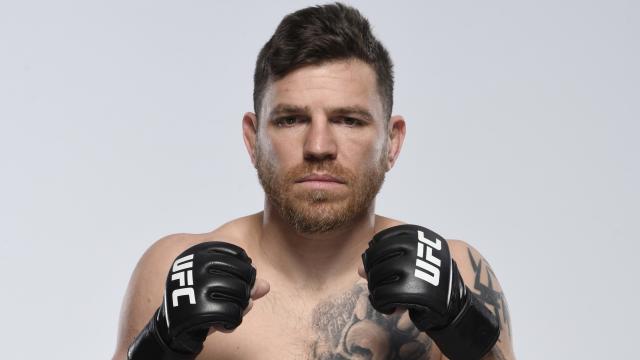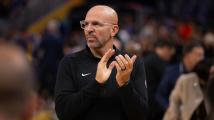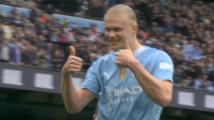Jim Miller opens up on his record-breaking UFC career
UFC veteran Jim Miller says the longevity of his career at or near the top of the lightweight division means more to him than the actual numbers on his multiple records. The 15-year MMA veteran heads into his 38th UFC fight on Saturday at UFC 40 against Erick Gonzalez.
Video Transcript
KEVIN IOLE: Hey folks. I am Kevin Iole. Welcome to Yahoo Sports, and my guest right now never fought for a UFC title, but this man is littered throughout the record books. On Saturday, over at Apex, he will be fighting UFC Vegas 40 against Erick Gonzalez. My guest, Jim Miller. Jim, how are you, my friend?
JIM MILLER: I'm good. I'm good. Thanks for having me on.
KEVIN IOLE: It is pretty incredible what you've done in your career. Just a couple of the records you have, you're tied for first, so you're going to break the record on Saturday, 37 UFC fights. Most lightweight fights, 35. Most lightweight wins, 19. Most lightweight subs, nine. Total lightweight fight time, almost six hours. Total submission attempts, 45. It's just incredible. Any one of those stand out to you as like the most significant or the most meaningful to you?
JIM MILLER: I mean, probably. Probably like wins in the division is probably the biggest one for me, you know. It's-- I don't know. I don't really care too much about the numbers, right? Like, you know, I'll step into the lead again for most fights in the UFC, but it's kind of arbitrary to me because I feel like I could have-- I'd be in the mid 40s if I could have been fighting as often as I wanted to. You know, I've had a few layoffs that weren't up to me, that have been between like, six and eight months, and it's like, man, I could fight two times in that period.
So it's cool, right? And like, I want to get to 40 in the UFC, and I think that'll be pretty easy to get to, but, yeah, the total number is not-- it's not a huge thing that I'm worried about.
KEVIN IOLE: What about the toll on your body? Because not only do you-- have you fought 38 times, and what? Six hours five hours 51 minutes in the octagon. But, you know, all that practice time it takes, and I would imagine that it puts a toll on your body.
JIM MILLER: It definitely does. I've had to change the way that I train over the last few years and, you know, some of it from having Lyme disease and some of it from being a professional athlete, a professional cage fighter. You know, it does take a toll and that's the thing like you said. The fight time and in the fight it does take a little bit out of you. You get some-- you know, banged up here and there. I've had some injuries in fights and plenty of cuts.
But the most-- like, the biggest injuries that have had the biggest toll on me have happened in the training, you know, so I really try to be smart about it and, you know, get to the fight, right? Like, that's kind of the biggest thing is getting the opportunity to actually step into the octagon. You're not going to advance your career if you don't actually get there. You're not going to work your way up the payroll if you don't actually get there. So that's kind of been the thing, like, you know, if I don't show up, I don't get paid, I don't get to fight, and then I don't get to work my way up the ladder.
KEVIN IOLE: Jim, I always think you're an example of what makes UFC successful compared to boxing because you're a guy, you haven't fought for a title, and we'll get into that in a second. But you haven't fought for a championship, you're not the number 1 ranked contender in the division. Yet, you know, you're on all these record lists, you're on shows regularly, you've had this big long career, and in boxing, that doesn't seem to exist, like, if you don't get a championship shot or you don't win, you kind of, you know, fade away and you're just not part of history.
What does it mean to you when you see all that and you look at how long your longevity has been compared to a lot of your peers? Does that mean something to you, the fact that you've hung in there and been near the top if not at the top for so long?
JIM MILLER: It does. It does. You know, there's an attrition rate, right? Like the-- I don't know what the average UFC career is, but it's still probably only under 10 fights at this point. So to be able to hang around and to be able to stay healthy and fight this many times and, you know, see plenty of other faces come and go, it does mean something, you know.
I've been doing something right, and I've definitely been getting lucky, [LAUGHS] you know, and not having to deal with some of the devastating injuries that some of my peers have had, but, yeah. It's a combination of a few different things that have helped me have this many fights and, yeah, it does. Like I said, it does mean something to be able to stick around so long.
KEVIN IOLE: I would imagine-- you know, you said before, you don't really care about all the records or anything but you would trade every record you have and all the accolades you've got to have fought in a championship fight. I mean, do you feel like you were ever close and what happened that you didn't get a chance to win the belt?
JIM MILLER: You know, this sport is all about timing. You've got to catch that wave, and I had it, you know, early in my career and, I was 9 and 1 in the UFC. There have been plenty of fighters that have gotten opportunities to fight for a title with less of a resume in the UFC. It was just-- you had two rematches, two sets of rematches at lightweight with Frankie and BJ, and then Frankie and Gray. You had an injury in there, an injury and a surgery that postponed the opportunity for anybody else to fight for the title as well with Frankie and Gray.
So there was a lot of time that was sucked up that myself and some of my-- you know, the other contenders at the time, could have had that opportunity. And it's just the way the cards fell, you know. I feel like I've been close again. I've had some fights that were-- you know, if I had performed, were probably title eliminators. My fight with Diaz and my fight with Cerrone was-- if I had had a great fight and, won those and won those in spectacular fashion, I feel like I could have gotten a title shot off of those as well.
So, you know, I've been there. It's just-- yeah, it's-- sometimes, sometimes other things happen, and like I said, with those rematches, that really kind of stagnated some things and it's just the way it goes.
KEVIN IOLE: You mentioned rematch. There was another set in there, Frankie Edgar and Benson Henderson, right? So--
JIM MILLER: [INAUDIBLE]
KEVIN IOLE: --went in and that became a third one. You've shed a lot of blood in the cage. You know, we've seen you sometimes. You look like a pro wrestler or something half the time when you come out of there. Have you ever asked yourself since you didn't get-- you know, why am I doing this? Like, you didn't get the title shot. Like, did you ever come close to saying, I give up, and moving on, doing something else given what you've sacrificed to be where you are?
JIM MILLER: You know, in like 2015, 2016, when I had Lyme disease and I didn't know it, I was close. I was actually going into the fight with Diego at UFC 196 with the plan to [INAUDIBLE] the fight at UFC 200 and that to be it. And, you know, fortunately, I was diagnosed and was able to get on a treatment. And I went from barely being able to train for that fight at 196 to-- you know, to coming out of it and kind of getting back, right? It took a long time to feel like I did or I should in my 30s as a fighter because I definitely felt like an 80-year-old man for a bit there.
KEVIN IOLE: [LAUGHS]
JIM MILLER: [LAUGHS] It was rough. But, yeah, I was super close, so I kind of made my-- you know, I made the decision, like, OK, or I not necessarily made a decision. But I prepared myself for the decision, you know, six years ago now. So I feel like some of my peers have a tough time dealing with it. They don't like to talk about retirement. And after having gone through that and been like, man, I can't do this, I can't compete at this level feeling the way that I was, and kind of getting back to it and being able to train again. I have a mature attitude with it. I was like, hey, you know what?
Like, I'm OK thinking about it. I'm OK talking about it because it's necessary. I'm not going to be able to fight until I'm 80. So, you know, there's got to be a change in my life and that's OK. And it's not a sign of quitting or sign of weakness like some people think it is to talk about retirement. You know, I have four kids. I'm the provider for our household, so there's a lot of responsibility. So it's OK to think about that and plan for it. And that's kind of what I've been trying to do. I'm trying to figure out what's exactly going to be next and the tough part is, is that I love being a professional fighter.
It's awesome. I get to work out for-- you know, my job is to go to the gym, train, and be in shape, and then fight, which I love doing as well. So it's going to be hard, but there's a side of me that's really, really excited for that last walk, for knowing that this is going to be my last one and, you know, it's going to be that bittersweet feeling of some closure, but, man, it's-- I don't know, it gets me excited. I get excited even thinking about it. It's definitely not going to be in the next few months. But, you know, when my time comes for that last fight, I'm going to know and you guys are going to know, and, yeah, I want to have a good time.
KEVIN IOLE: When that day comes, you know, what will be next because at least at this stage in MMA development, coaches don't make a ton of money, right? You know, in boxing, you have some coaches that make big money, right? And you don't have that in MMA just yet. I assume at some point that will come and you'll have that but-- so what would be next for you because I'm assuming, hey, you made some money in your MMA career, but, you know, you're what? 40 years old. You're going to need to work for your family for another 25 years, right? So what would be next?
JIM MILLER: You know, I haven't found the one thing, right? And that's kind of the-- that's the tough part, is that the freedom that I have as a fighter, I get to do a lot of stuff. I get to, you know, put on a lot of hats outside of fighting, and I kind of want to keep that and I kind of want to keep that ability to have the time to do the things that I want to do, and so it's really just about setting up, like, different streams of income. So who knows? I would like to potentially get into either commentating or analysts. I feel like that I've earned a lot of respect of my peers where my input would be respected by, you know, the other fighters.
You know, I had the gym. I ended up selling it earlier this year because that's-- as much as I enjoy teaching, I don't want to live in the gym, you know, every night from 5 o'clock to 9 o'clock, and miss out on those things that I could be doing with my family. So, you know, that was-- it was bittersweet. It was a difficult decision and an easy decision at the same time. COVID kind of kicked our butt and it made it a little bit easier, but, you know, I feel like I'm in a good place. It's in good hands. I still train there. So, you know, we'll see. I'm not sure exactly what that definitive next thing is, but I've got a few things that I'm, you know, teasing on and playing with.
KEVIN IOLE: I know for sure what the actual next thing is and that's going to be Saturday night against Erick Gonzalez. So let's wrap with this. Just tell me, Erick fought a lot in Combate Americas and, you know, a good fighter but give me your take on him, the challenge he presents you, and what you have to do to add to that submission total you have.
JIM MILLER: You know, he's a game fighter, man. He comes in and he's reckless. He comes in and he fights hard which is dangerous because that's where he's going to have opportunities, you know, to land a good strike to hurt me, but it's also where I thrive, the guys that have had the best success against me or guys that slow me down and either use their range or kind of smother me. And I don't think that's his play. I don't think that's in his skill set to do that. So if he wants to fight a slow fight, then I feel it's going to be a relatively easier night for me.
But, you know, the fast fight, him being aggressive, that's where I finish guys too. So he's a tough kid and he's here, he's dangerous. [LAUGHS] So it's exciting. I like fighting the veterans, and I like fighting the newcomers in every skill set, every body type. Every other fighter is an opportunity for me to show off my skill set. So I just look at it as an opportunity to go out and, you know, throw another notch in that submission list, and hopefully, throw another bonus in there too, and we'll see, but, yeah, I'm excited just like I am for every other fight.
KEVIN IOLE: Well, I'll tell you, I will need oxygen. If I have to read any longer of the record list that you have. [INAUDIBLE] pull that off. Jim Miller, great job. Thank you so much. Good luck on Saturday. I appreciate your time, brother.
JIM MILLER: Thank you very much.








